高考英语必考40个重点句型(2)
高考考前必背的英语句型
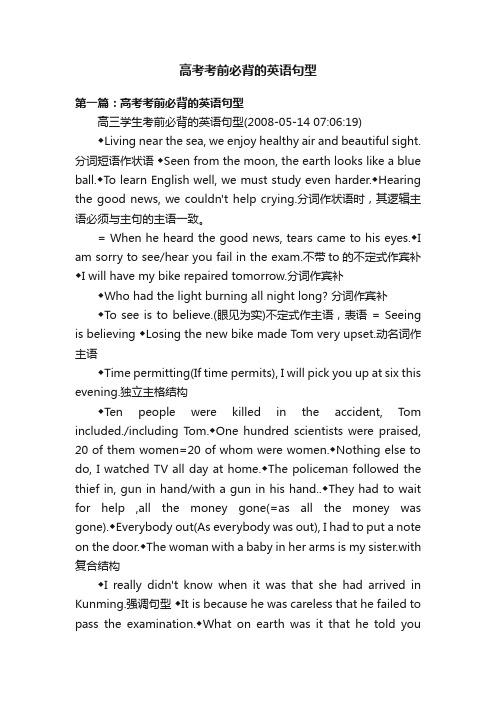
高考考前必背的英语句型第一篇:高考考前必背的英语句型高三学生考前必背的英语句型(2008-05-14 07:06:19)◆Living near the sea, we enjoy healthy air and beautiful sight.分词短语作状语◆Seen from the moon, the earth looks like a blue ball.◆To learn English well, we must study even harder.◆Hearing the good news, we couldn't help crying.分词作状语时,其逻辑主语必须与主句的主语一致。
= When he heard the good news, tears came to his eyes.◆I am sorry to see/hear you fail in the exam.不带to的不定式作宾补◆I will have my bike repaired tomorrow.分词作宾补◆Who had the light burning all night long? 分词作宾补◆To see is to believe.(眼见为实)不定式作主语,表语 = Seeing is believing ◆Losing the new bike made Tom very upset.动名词作主语◆Time permitting(If ti me permits), I will pick you up at six this evening.独立主格结构◆Ten people were killed in the accident, T om included./including Tom.◆One hundred scientists were praised, 20 of them women=20 of whom were women.◆Nothing else to do, I watched TV all day at home.◆The policeman followed the thief in, gun in hand/with a gun in his hand..◆They had to wait for help ,all the money gone(=as all the money was gone).◆Everybody out(As everybody was out), I had to put a note on the door.◆The woman with a baby in her arms is my sister.with 复合结构◆I really didn't know when it was that she had arrived in Kunming.强调句型◆It is because he was careless that he failed to pass the examination.◆What on earth was it that he told youabout in the street yesterday?◆Was it in 1969 that the A merican astronaut succeeded in landing on the moon ?◆Was it in 1939 when World War Two broke out that they got married?强调句型+定语从句◆Only when the bus has stoppedcan you get off it倒装◆Not until the early years of the 19th century did man know what heat is.◆N ot only will I give you the book, but I also will give you some money.◆Hardly/Scarcely had I gone out of the room when I heard the bell ring.No sooner…than◆Doctor as /though he is, he can't cure her of the disease.倒装+让步状从◆Were I you(If I were you),I woul d go there myself.倒装+虚拟语气◆It is necessary/strange/ important/natural/a pity that we(should)change our plan.虚拟语气◆Had it not been for /But for/Without your help, our experiment wouldn't have been so successful.◆Should it rain(If it should rain)tomorrow, we would have to put off the match.◆If you had taken the medicine last night, you would feel better now.◆Given more time(=If we had been given…), we could have done better.◆It is about time that you went home now.◆I would rather you came here tomorrow morning./I would rather you hadn’t said that yesterday◆You should have finished your homework yesterday.◆If onlyI could fly like a bird./ I wish I could fly like a bird◆He suggested that we(should)set off early./ It was suggested that we(should)set off early◆His suggestion was that we(should)set off early./His suggestion that we(should)set off early was considered..◆The teacher insisted that Tom was a good student and thathe(should)be praised.◆It is so difficult a maths problem that we could hardly work it out.结果状语从句◆It is so easy an exercise that all of us can do it.=It is such an easy exercise that all of us can do it.◆It is so difficult a maths problem as we could hardly work out.定语从句◆It is such an easy exercise as all of us can do.◆This is the very/best/last book(that)I am looking for.All that could be done has been done.◆Is this museum the one(that)they visited that day?Cf: Is this the museum(that)they visited that day?◆Mrs Wang was disappointed to find the TV set she had repaired went wrong again ◆I l ike the city of Hangzhou, where stands a famous tower.◆The manager will see you on Sunday, when he will be free from all those troubles.◆The news(that)Tom told us was true.◆The news that our team had won was true.同位语从句(that不能省略,不充当句子成份)◆What do you think of the suggestion that she(should)try it once more?◆Their suggestion that we(should)open up another oil field here made us excited ◆The news that we would go to Mount Tai during the summer holidays delighted us.◆Have you any idea how the problem would be solved ?◆Whatever I have will be yours sooner or later.主语从句◆It worried her a bit that her hair was turning grey./It's quite clear that he will go to the doctor's tomorrow.◆It is well known that the earth moves around the sun./Whether he'll go to his uncl e's is still unknown.◆What he has done has nothing to do with us./What we need are experienced doctors ◆That you don't like him is none of my business.◆Whoever told you that was lying.(=Anyone who told you that was lying.)◆Whether he will accept the gift d oesn’t matter at all.◆What the workers insistedon was that they be given more pay.主语从句+表语从句◆What the old man's sons wanted to know was where the gold had been hidden.◆What he is worrying about is whether he can find a job soon.◆That is just where they ar e mistaken.表语从句◆The reason why I don't go to France wasthatI got a new job.定语从句+表语从句◆Whether we can go camping depends on whether it will be fine tomorrow.主从+宾从◆These ancient Indians used to live in what is now a part of the United States.◆The bike is i n good order except that there's something wrong with the front wheel.◆When he invented the telephone, Alexander Graham Bell was still a young man.时间状从◆He had just got up/ I was watching TV when someone knocked at the door.◆It was 11:30 when we got home l ast night.cf.It was at 11:30 that I got home last nigh◆Each/Every(Last/Next)time he tried the experiment , he got the same result.◆The minute/moment/second/instant/Immediately/Instantly I saw Tom, I recognized him.(=as soon as)◆Stay where you are until I come back.地点状从Where there is a will, there is a way.◆Young people should go where they are most needed.地点状从◆If you work hard, you'll make much progress.条件状从=Work hard, and you’ll make much progress.并列句◆The harder you work, the better progress you will m ake.=If you work harder, you will make better progress.◆He talks about the US as if he had been there many times./ You must do as the teacher tells you to.方式状从◆This room is 4 times as large as that one.=the size of thatone/ 3 times larger than that one 比较状从◆However hard the job is(=No matter how hard …), we ought to try our best.让步状从◆Even if I know he won't agree, I'll still try to persuade him.Whether you like it or not, you should study hard.◆While I agree that Tom is not perfect, he is still a good s tudent.◆Whatever the house costs(=No matter what …), it will be worth it.让步状从◆Whatever he says(=Anything that he says)sounds reasonable.主语从句◆I have seen him twice during the past week.现在完成时◆He hurried to the station only to find that the train had gone◆He is the only one of the students who is good at singing.主谓一致◆It is Tom and Mary that are to blame for the accident.◆Neither you nor I am a fool;Not you but T om is a fool.◆All are here and all is going well.◆No one but/except T om and Mary knows my address。
高中英语高考必背句型(共50个)
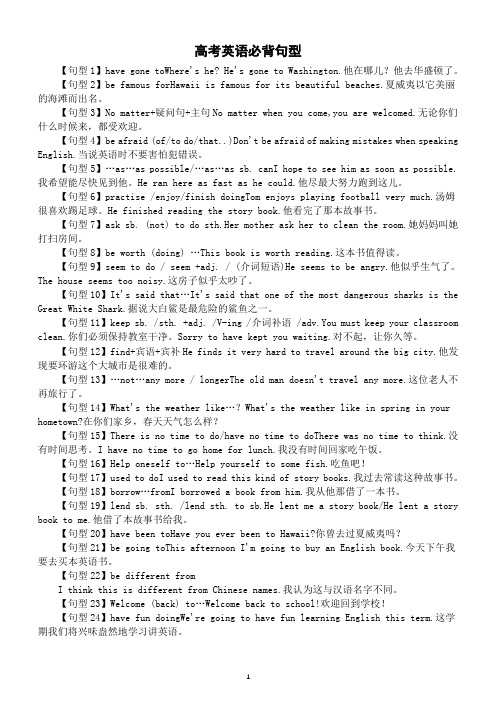
高考英语必背句型【句型1】have gone toWhere's he? He's gone to Washington.他在哪儿?他去华盛顿了。
【句型2】be famous forHawaii is famous for its beautiful beaches.夏威夷以它美丽的海滩而出名。
【句型3】No matter+疑问句+主句No matter when you come,you are welcomed.无论你们什么时候来,都受欢迎。
【句型4】be afraid (of/to do/that..)Don't be afraid of making mistakes when speaking English.当说英语时不要害怕犯错误。
【句型5】…as…as possible/…as…as sb. canI hope to see him as soon as possible.我希望能尽快见到他。
He ran here as fast as he could.他尽最大努力跑到这儿。
【句型6】practise /enjoy/finish doingTom enjoys playing football very much.汤姆很喜欢踢足球。
He finished reading the story book.他看完了那本故事书。
【句型7】ask sb. (not) to do sth.Her mother ask her to clean the room.她妈妈叫她打扫房间。
【句型8】be worth (doing) …This book is worth reading.这本书值得读。
【句型9】seem to do / seem +adj. / (介词短语)He seems to be angry.他似乎生气了。
The house seems too noisy.这房子似乎太吵了。
高考英语作文常用句子及翻译及高级句型【40个】
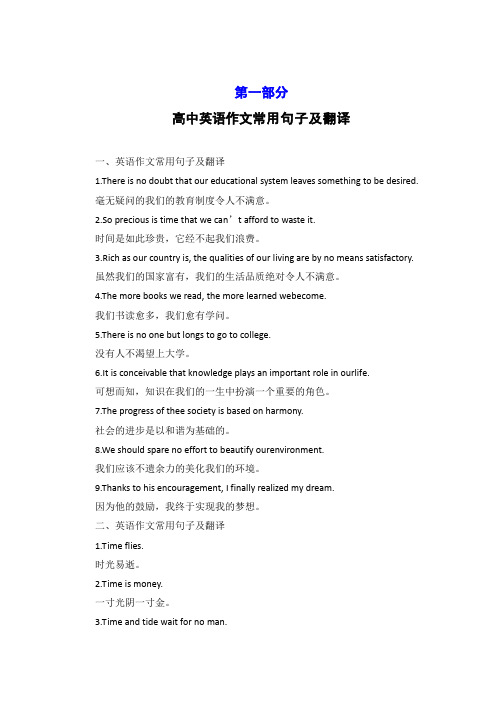
第一部分高中英语作文常用句子及翻译一、英语作文常用句子及翻译1.There is no doubt that our educational system leaves something to be desired. 毫无疑问的我们的教育制度令人不满意。
2.So precious is time that we can’t afford to waste it.时间是如此珍贵,它经不起我们浪费。
3.Rich as our country is, the qualities of our living are by no means satisfactory. 虽然我们的国家富有,我们的生活品质绝对令人不满意。
4.The more books we read, the more learned webecome.我们书读愈多,我们愈有学问。
5.There is no one but longs to go to college.没有人不渴望上大学。
6.It is conceivable that knowledge plays an important role in ourlife.可想而知,知识在我们的一生中扮演一个重要的角色。
7.The progress of thee society is based on harmony.社会的进步是以和谐为基础的。
8.We should spare no effort to beautify ourenvironment.我们应该不遗余力的美化我们的环境。
9.Thanks to his encouragement, I finally realized my dream.因为他的鼓励,我终于实现我的梦想。
二、英语作文常用句子及翻译1.Time flies.时光易逝。
2.Time is money.一寸光阴一寸金。
3.Time and tide wait for no man.岁月无情;岁月易逝;岁月不待人。
备考冲刺(二) 各类应用文常用句型必备-2020年高考英语书面表达临考冲刺及押题

备考冲刺(二)各类应用文常用句型必备(1)感谢信:开头句:1、I’m extremely grateful/ thankful to you for your unselfish assistance during ….2、I wish to thank you from the bottom of my heart for….3、I would like to take this opportunity to express my great appreciation for your timely help and assistance.4、I would like to convey in this letter my heartfelt thanks to you for your selfless help.5、On behalf of …, I would like to extend my sincere gratitude for your help.6、I’m writing to express/convey/extend my sincere/heartfeltgratitude/appreciation to you for your timely/generous help/assistance/what you have done for me, without which I wouldn’t have made such rapid progress.篇中句:1、It is you who help me out and give me the courage to move forward.2、If it had not been for your kind assistance in my study, I fear that I would have failed in the exams.3、It is your enthusiasm, generosity as well as devotion that inspire us and arouse our thirsty for English.结尾句:1、It was kind and generous of you to do this for me, and I appreciate it more than I can say.2、I wish there were a better word than “thanks” to express my appreciation for your generous help.3、I will be more than pleased if I have the opportunity to repay your kindness by….4、Thanks again for your kind help./ Again, I would like to express our sincere thanks to you.(2)道歉信:开头句:1.I am sorry to say that I am unable to attend your birthday partybecause ….2.I am writing to apologize for…/ say sorry for…./I am writing toexpress/convey my heartfelt apology to you for….3.I’m writing to tell you that I can’t make it to the English play as wepreviously planned.4.I’m writing to make an apology for the change of the plan for thecoming Sunday.5.I’m extremely grateful/ thankful to you for your unselfish assistanceduring ….6.I wish to thank you from the bottom of my heart for….7.I would like to take this opportunity to express my great appreciationfor your timely help and assistance.篇中句:1.The reason why I failed to show up is that I had something urgent toattend to.2.I would like to express my deep regret over the misunderstandingbetween us.3.I’m awfully sorry for the sudden change of plan and feel it a great pity tomiss the opportunity to be with your students.结尾句:1.Anyway, I feel so sorry for what had happened. I hope you willunderstand and forgive me.2.I’ll try to make up for my fault.3.I apologize to you for all the inconvenience caused.4.What a pity it is that I’ll miss the English play.5.I sincerely hope you can accept my apologies and understand mysituation.(3)建议信:开头句:1.I am sorry to learn that you have problem in fitting in with the newenvironment. However, the situation is easy to change if you take myadvice. Here are some tips for you.2.I am (more than) delighted to receive your letter asking for my adviceon how to learn English well.3.I would like to make some constructive suggestions/ offer you thefollowing suggestions, hoping to help you.篇中句:1.I strongly suggest that the government should take steps such asbuilding an overpass. / It is high time that necessary steps should betaken, such as building an overpass.2.It also helps to listen to Chinese songs and watch Chinese movies, whichcan enable you to gain a better understanding of Chinese.结尾句:1.I sincerely hope that my advice is of great help to you.2.I firmly believe you can make it only if you follow my advice.3.I hope you will find my suggestions beneficial and make great progresssoon.(4)申请信:开头句:1.Learning from … that you are looking for …,I would like to apply forthe position.2.I saw your advertisement on the Internet/ in a newspaper and I showgreat interest in ….3.I am glad that I feel quite qualified for the position you advertised.4.I am extremely pleased to see your advertisement for the position in ....and I am confident that I am suitable for the kind of the job you areadvertising.篇中句:1.I trust myself that I have the appropriate qualifications and experiencefor this post.2.I have teamwork spirit and can get on well with other people.3.Not only am I good at… but also I am experienced in….4.I have been working in … since …, and have therefore gained richknowledge and experience in this field.5.I am confident that my experiences and references will show you that Ican fulfil the particular requirements of your position.6.Should an interview be desired, I shall be happy to call at any time youmay appoint.结尾句:1.I hope you will be kind enough to consider my application favorably.2.I shall be much grateful if you will offer me a precious opportunity to aninterview.3.Thank you for considering my application and I am looking forward tohearing from you.4.I am sure I will do it well if you give me the chance to be a member ofyour company.5.I would greatly appreciate it if you could take my application intoconsideration.(5)求助信:开头句:1.I am a middle school student and I am writing to tell you my problemwhich has troubled me for a long time.2.I’m writing to you to ask whether you could do me a favor.3.I’m sorry to bother you, but I have some difficulties here and badlyneed your help.4.I have some difficulty in doing… which bothers me a lot. Therefore, Ihave no choice but to turn to you for help.5.I am writing to you in the hope that you will be so kind as to do me afavor.篇中句:1.I long to learn English well, but I don’t know how, which makes meupset.2.I can’t concentrate on my lesson s these days, and I failed in the lastexam, which worries me a lot.3.I often feel left out in this school, and I don’t know how it has comeabout.4.Facing/ faced with so many difficulties, I have to turn to you for help.结尾句:1.I'm eager to get your timely he lp. / I’m eager for your timely help.2.I will be very grateful if you could help me…/I would appreciate it if youcould do me a favor and ….3.I’d appreciate it if you could take my request intoconsideration/account.4.I would be grateful if you really give me a hand.(6)投诉信:开头句:1.I’m writing to make a complaint about your standard service.2.I’m most unwilling to complain, but the service attitude of yourassistants is really annoying.3.I’m …a customer who bought … from your website several days ago. Iam writin g to you to complain about ….4.I am writing to express my dissatisfaction with / at your unfriendlyattitude to customers.篇中句:1.To improve the situation, it is advisable for you to take the followingmeasures.2.I do hope that someone will take effective measures to deal with thismatter.3.I would like to draw your attention to the quality of your products.4.I sincerely hope you can better your service and that mistake won’t ariseagain in the future.5.Can you arrange a new one for me as soon as possible?结尾句:1.I hope /I would appreciate it if you will give due attention to the matter.2.I would be highly appreciated if you could do something about it.3.I am really annoyed about it. I trust/ have great faith that you will takemy complaints seriously.(7)邀请信:开头句:1. It’s my pleasure/a great honor for me to invite you to join in...我非常荣幸地邀请你和我们一起....2. Knowing that you're interested in … , I'm delighted to invite you to ...知道你对....感兴趣,我非常高兴地邀请......3. I do want to accept your invitation but I'm terribly sorry to tell you ...我真想接受你的邀请,但是我很抱歉地告诉....4. I'm honored that you can invite me to join in ... but I feel sorry that ...你邀请我参加....我深感荣幸,但我觉得很抱......5. We are having planning ... on ... (date) and we feel it would be a great idea if you could join us.我们定......期....动),如果你能来参加就太好了。
高考英文文法知识点归纳总结

高考英文文法知识点归纳总结英语语法是高考英语考试的重要内容之一,良好的语法基础对于学生的英语成绩有着重要的影响。
下面将对高考英文文法知识点进行归纳总结,帮助考生更好地掌握和应用这些知识点。
一、一般现在时一般现在时表示经常发生的动作、现实存在的状态或普遍性的真理。
1. 肯定句:主语+动词原形(第三人称单数加-s)例如:She speaks English fluently.2. 否定句:主语+do/does not+动词原形例如:He does not like coffee.3. 一般疑问句:Do/does+主语+动词原形?例如:Do you play basketball?二、一般过去时一般过去时表示在过去某个时间发生的动作或状态。
1. 肯定句:主语+动词过去式例如:They visited the museum last week.2. 否定句:主语+did not+动词原形例如:He did not finish his homework yesterday.3. 一般疑问句:Did+主语+动词原形?例如:Did you watch the movie last night?三、一般将来时一般将来时表示将来某个时间会发生的动作或状态。
1. 肯定句:主语+will+动词原形例如:I will call you tomorrow.2. 否定句:主语+will not+动词原形例如:She will not attend the meeting.3. 一般疑问句:Will+主语+动词原形?例如:Will they arrive on time?四、现在进行时现在进行时表示现在进行的动作或临时的状态。
1. 肯定句:主语+am/is/are+动词-ing例如:They are studying in the library now.2. 否定句:主语+am/is/are not+动词-ing例如:She is not playing tennis at the moment.3. 一般疑问句:Am/Is/Are+主语+动词-ing?例如:Are you listening to music?五、过去进行时过去进行时表示在过去某个时间正在进行的动作。
高考英语重点句型归纳
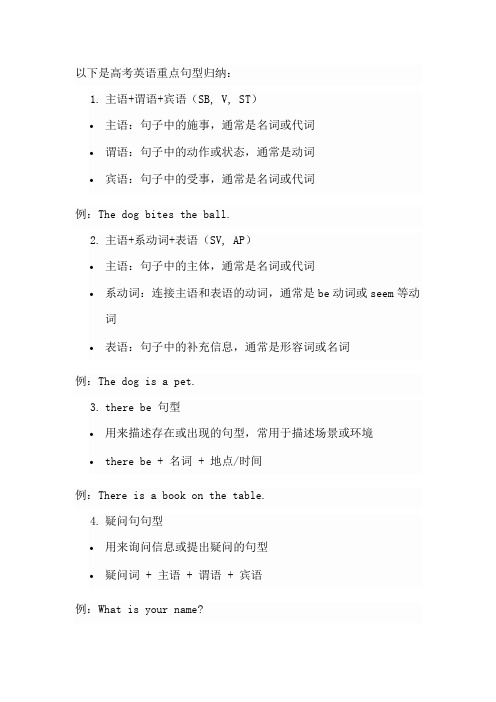
以下是高考英语重点句型归纳:1.主语+谓语+宾语(SB, V, ST)•主语:句子中的施事,通常是名词或代词•谓语:句子中的动作或状态,通常是动词•宾语:句子中的受事,通常是名词或代词例:The dog bites the ball.2.主语+系动词+表语(SV, AP)•主语:句子中的主体,通常是名词或代词•系动词:连接主语和表语的动词,通常是be动词或seem等动词•表语:句子中的补充信息,通常是形容词或名词例:The dog is a pet.3.there be 句型•用来描述存在或出现的句型,常用于描述场景或环境•there be + 名词 + 地点/时间例:There is a book on the table.4.疑问句句型•用来询问信息或提出疑问的句型•疑问词 + 主语 + 谓语 + 宾语例:What is your name?5.祈使句句型•用来表示请求、命令或建议的句型•动词原形 + 其他成分例:Please close the door.6.强调句型•用来强调句子中的某个成分,常用于强调名词、动词、形容词或副词•It is/was + 被强调部分 + that + 其他部分例:It was yesterday that I saw the movie.7.从句句型•用来连接句子或从句子中分离出来的部分,常用于补充信息或修饰主句•从句通常由连接词引导,可以是名词性从句、定语从句或状语从句例:The book that I borrowed from the library is very interesting.(定语从句)。
高中英语必备40个高级句型高考必备
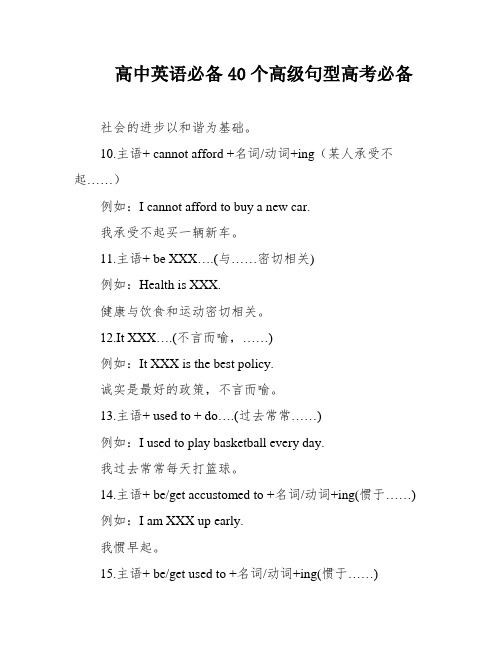
高中英语必备40个高级句型高考必备社会的进步以和谐为基础。
10.主语+ cannot afford +名词/动词+ing(某人承受不起……)例如:I cannot afford to buy a new car.我承受不起买一辆新车。
11.主语+ be XXX….(与……密切相关)例如:Health is XXX.健康与饮食和运动密切相关。
12.It XXX….(不言而喻,……)例如:It XXX is the best policy.诚实是最好的政策,不言而喻。
13.主语+ used to + do….(过去常常……)例如:I used to play basketball every day.我过去常常每天打篮球。
14.主语+ be/get accustomed to +名词/动词+ing(惯于……)例如:I am XXX up early.我惯早起。
15.主语+ be/get used to +名词/动词+ing(惯于……)例如:I am used to the cold weather here.我已经惯了这里的寒冷天气。
16.主语+ be suppos ed to + do….(应该……)例如:XXX at the airport two hours before the flight. 我们应该在飞行前两个小时到达机场。
17.主语+ be likely to + do….(可能……)例如:It XXX.晚些时候可能会下雨。
18.主语+ be willing to + do….(愿意……)例如:I am willing to help you with your homework. 我愿意帮你做作业。
19.主语+ be eager to + do….(渴望……)例如:She is eager to learn Chinese.她渴望研究中文。
20.主语+ be capable of +名词/动词+ing(能够……)例如:I am capable of finishing the project on time.我能够按时完成这个项目。
高考教学英语必考40个重点句型
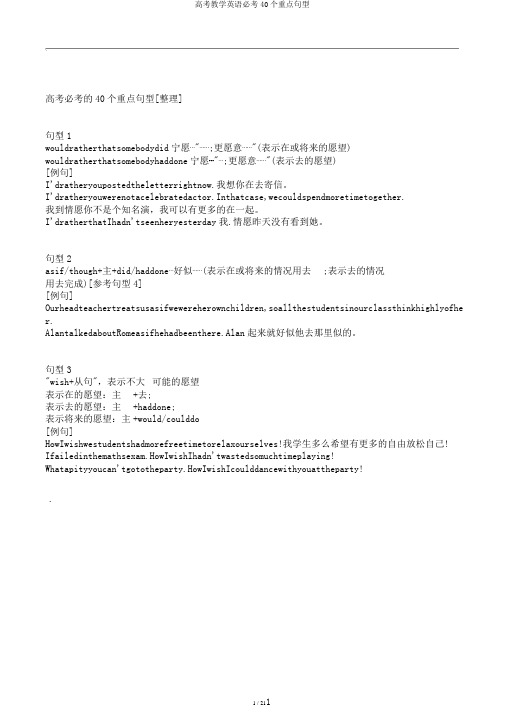
高考必考的40个重点句型[整理]句型1wouldratherthatsomebodydid 宁愿⋯"⋯⋯;更愿意⋯⋯"(表示在或将来的愿望) wouldratherthatsomebodyhaddone 宁愿⋯"⋯;更愿意⋯⋯"(表示去的愿望)[例句]I'dratheryoupostedtheletterrightnow.我想你在去寄信。
I'dratheryouwerenotacelebratedactor.Inthatcase,wecouldspendmoretimetogether.我到情愿你不是个知名演,我可以有更多的在一起。
I'dratherthatIhadn'tseenheryesterday我.情愿昨天没有看到她。
句型2asif/though+主+did/haddone⋯好似⋯⋯(表示在或将来的情况用去;表示去的情况用去完成)[参考句型4][例句]Ourheadteachertreatsusasifwewereherownchildren,soallthestudentsinourclassthinkhighlyofhe r.AlantalkedaboutRomeasifhehadbeenthere.Alan起来就好似他去那里似的。
句型3"wish+从句",表示不大可能的愿望表示在的愿望:主+去;表示去的愿望:主+haddone;表示将来的愿望:主+would/coulddo[例句]HowIwishwestudentshadmorefreetimetorelaxourselves!我学生多么希望有更多的自由放松自己! Ifailedinthemathsexam.HowIwishIhadn'twastedsomuchtimeplaying!Whatapityyoucan'tgototheparty.HowIwishIcoulddancewithyouattheparty!.→句型4It'shigh/abouttimethatsomebodydid(shoulddo)(should通常不省略) ⋯早就⋯⋯[例句]It'stimethatyouwenttoschool.=It'stimethatyoushouldgotoschool.It'shightimethatwedidsomethingtoimproveourenvironment.是我保做些事情了。
- 1、下载文档前请自行甄别文档内容的完整性,平台不提供额外的编辑、内容补充、找答案等附加服务。
- 2、"仅部分预览"的文档,不可在线预览部分如存在完整性等问题,可反馈申请退款(可完整预览的文档不适用该条件!)。
- 3、如文档侵犯您的权益,请联系客服反馈,我们会尽快为您处理(人工客服工作时间:9:00-18:30)。
高考英语必考40个重点句型(2)句型11强调句型基本构成:It is/was + 被强调的部分+ who(强调部分指人时)/that (强调部分可以是人也可以是事物)+ 原句剩余部分[例句1]I saw him in the street yesterday afternoon.→It was I who saw him in the street yesterday afternoon.(强调主语)→It was in the street that I saw him yesterday afternoon.(强调地点状语)→It was yesterday afternoon that I saw him in the street.(强调时间状语)→It was him that/who I saw in the street yesterday afternoon.(强调宾语)[例句2]He didn't go to bed until his mother came back.→It was not until his mother came back that he went to bed.句型12(1)、祈使句(表条件)+ or/or else/ otherwise + 主句(2)、祈使句(表条件)+ and +主句(表结果)[例句1]Hurry up, or you'll be late for class.快点儿,否则你上课要迟到了。
[例句2]Work hard and you will make progress every day.好好学习,天天向上。
句型13…until…."直到……时候"not…until…"直到……才……"[例句1]You are to stay until your mother comes back.你得等到你妈妈回来。
The meeting was put off until ten o'clock.会议推迟到十点钟。
[例句2]The villagers didn't realize how serious the pollution was until all the fish died in the river.→Not until all the fish died in the river did the villagers realize how serious the pollution was.等到湖里的鱼全死光了,村民们才意识到污染是多么严重。
句型14unless…"除非,如果不……"(=if…not)[例句]I shall go tomorrow unless it rains.如果不下雨,我明天去。
I won't attend his birthday party unless invited (=unless I am invited).除非被邀请,否则我不去参加的生日晚会。
句型15(1)、主语+ was/were doing…when…"正在做某事这时……"(2)、主语+ was/were about to do…when…=主语+was/were on the point of (doing) …when…"正要去做某事这时……"(3)、主语+ had done…when…"刚刚做完某事这时..."[例句1]I was walking along the river when I heard a drowning boy cry for help.我正在河边行走,这时我突然听到一个落水男孩求救。
[例句2]I was about to leave when it began to rain.我刚要离开,这时下雨了。
[例句3]I had just finished my exam paper when the bell rang, announcing the class was over.我刚做完试卷下课就铃响了。
句型16while:"当/在……时候","尽管"、"虽然","然而;可是"[例句1]While I admit that the problem is difficult, I don't think that they can't be solved.尽管我承认这个问题很难,但是我并不认为无法解决。
[例句2]I earn only 120 dollars a week, while she earns 180 dollars. 我一星期只赚120美元,她却赚180美元。
句型17where:可以引导地点状语从句、定语从句和名词性从句。
[例句1]Where there is a will, there is a way. (地点状语从句)有志者,事竟成。
[例句2]That is the building where my father works. (定语从句)那是我父亲工作的大楼。
[例句3]We could see the runners very well from where we stood.(宾语从句)从我们所站的地方能很清楚地看到赛跑的选手。
句型18what:引导名词性从句,在句子里可以充当主语、宾语、表语、定语。
[例句1]What is most important in life isn't money. (主语从句)人生最重要的并非是金钱。
[例句2]Will you show me what you bought? (宾语从句)可以把你所买的东西给我看一下吗?[例句3]Mary is no longer what she was ten years ago. (表语从句)Mary已经不是10年前的她了。
句型19as引导的非限制性定语从句[注意1]as通常只指整个句子的内容,不表示部分内容。
[注意2]as引导的非限制性定语从句通常指"事先可以预料到的","料想到的",表达"好"的方面。
[例句]This is also part of your work, as I told you before. 我曾告诉过你,这也是你工作的一部分。
The man was a teacher, as was evident from his way of speaking. 从那人说话的样子可明显看出,他是个老师。
句型20which引导的非限制性定语从句which引导的非限制性定语从句既可以指整个句子内容,也可以指句子的部分内容(如单词或词组等)。
[例句]Yellowstone National Park, which is in Wyoming, is one of the most beautiful national parks in the world.黄石国家公园位于怀俄明州,是世界上最美丽的国家公园之一。
She changed her mind again, which made us all angry. 她又改变了主意,这使我们大家都生气了。
句型21疑问词+ever (whatever, whoever, whichever, whomever,whenever, wherever,however):既可以引导名词性从句,也可以引导让步状语从句。
[例句]We will do whatever we can to help him out. (宾语从句)我们要尽力帮助他摆脱困境。
Whatever (=No matter what) may happen, we shall not lose hope.(让步状语从句)无论发生什么事,我们都不能失去希望。
[注意]:“No matter+疑问词”只能引导让步状语从句。
句型22完全倒装句型(1)here, there, out, in, up, down, now, then, away等副词放在句首,句子需要全部倒装[例句]There goes the bell! = The bell is ringing. 铃响了!Here comes the bus. =The bus is coming. 汽车来了。
Then came the hour we had been looking forward to.我们期盼的时候到了。
句型23完全倒装句型(2)表示方位的介词短语放在句首,句子完全倒装,此时谓语动词多为be, lie, stand, sit, come, walk, run, stop etc. 不及物动词。
[例句]On a hill in front of them stands a great castle.在他们面前的山上矗立着一座巨大的城堡。
In front of the house stopped a police car.房子的全面停着一辆警车。
Under the tree sat a boy of about ten.在树下坐着一个大约10岁的男孩。
句型24部分倒装句型(1)否定意义的副词或短语放在句首,句子半倒装。
主要有:little, seldom, hardly, rarely, scarcely, never, not at all, by no means(决不), at no time(在任何时候都不),nowhere, in no case (无论如何都不);not in the least (=not at all) , on no condition(决不) 等。
[例句]Never shall I forget you.我绝不会忘记你。
At no time was the man aware of what was happening.那个人根本没有注意到发生的情况。
Little did I understand what he said to me at that time.我那时几乎没有明白他给我说的话。
Not a single mistake did he make in the exam.他在考试中没有犯一个错误。
句型25部分倒装句型(2)only + 状语(副词/介词短语/状语从句)[例句1]Only then did I realize the importance of English.那个时候我才意识到英语的重要性。
